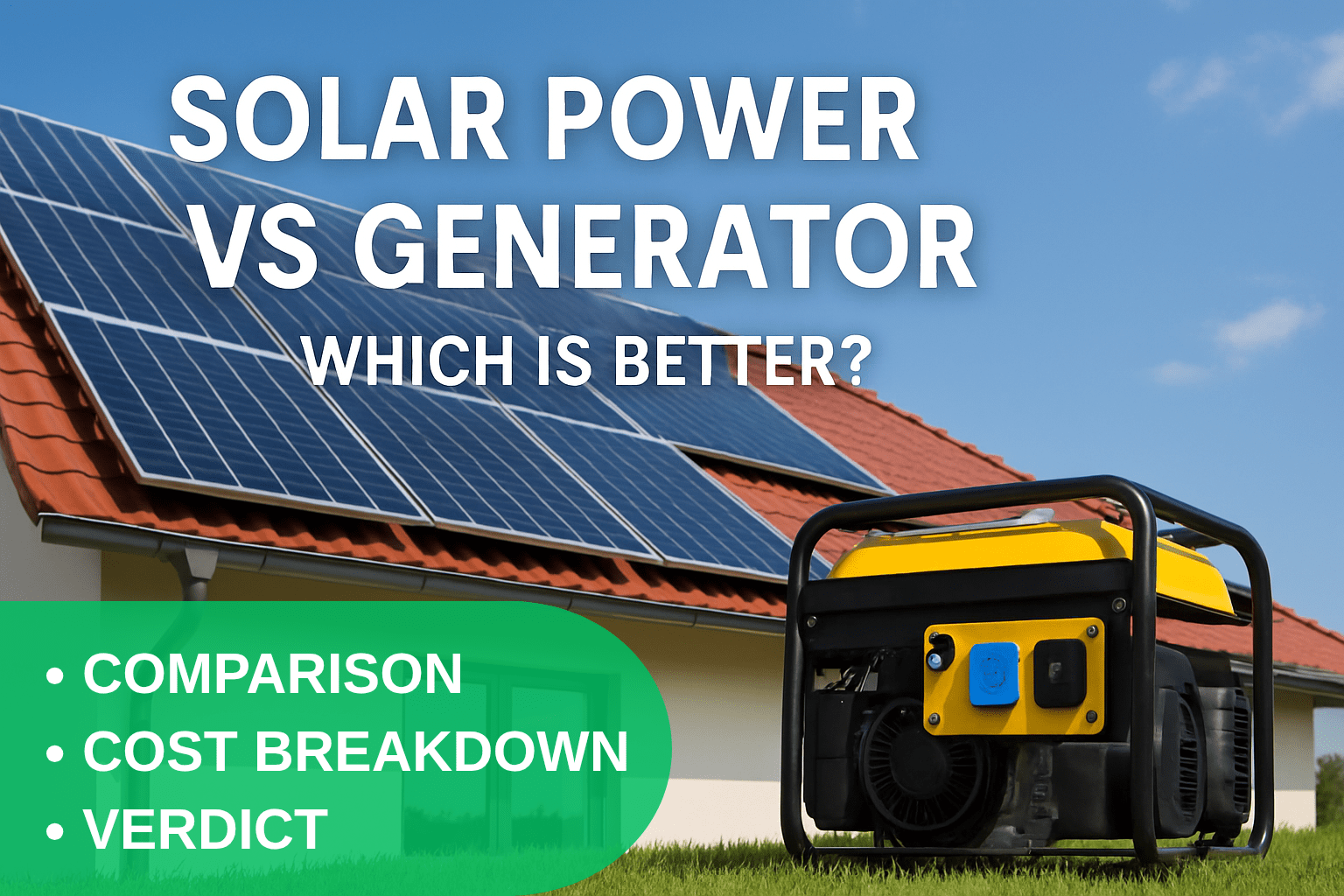India’s energy demand is growing, and so is the need for reliable backup power—especially with power cuts still common in rural and semi-urban areas. As technology advances in 2025, the two main options—solar power and generators—continue to compete. But which one offers better value, reliability, and sustainability? This blog compares solar power vs generator across key decision-making factors to help homeowners like you choose the smarter energy solution.
Quick Overview: Solar Power vs Generator
Solar Power
- Converts sunlight into electricity via photovoltaic panels
- Requires an inverter (and batteries for off-grid usage)
- Government subsidies reduce the installation cost significantly
- Ideal for long-term savings and sustainable living
Generator
- Produces electricity by burning diesel, petrol, or LPG
- Can run high-powered appliances instantly
- Cheaper upfront but has recurring costs and pollution
- Common in emergency setups or short outages
Cost Breakdown
| Category | Solar Power | Generator |
| Initial Investment | ₹70,000–₹1.5 lakh (after subsidy) | ₹20,000–₹80,000 |
| Running Cost | Almost zero (free sunlight) | ₹2,000–₹6,000/month (fuel, oil) |
| Government Subsidy | Yes (up to ₹78,000 under Yojana) | No |
| Maintenance Cost | Minimal | High (frequent servicing) |
Verdict: Solar is expensive upfront but wins long-term due to zero fuel cost and government support.
Maintenance & Lifespan
Solar Power:
- Needs panel cleaning every few months
- No moving parts = fewer breakdowns
- Lifespan: 25–30 years
Generator:
- Requires regular oil changes, fuel refills, and servicing
- Prone to wear and tear
- Lifespan: 5–10 years
Verdict: Solar is almost maintenance-free and lasts 3x longer than most generators.
Environmental Impact
Solar Power:
100% clean energy
Zero carbon emissions
No noise pollution
Generator:
Emits CO₂ and other harmful gases
Produces loud noise
Dependent on fossil fuels
According to UNEP, clean energy like solar significantly reduces air pollution and carbon footprint.
Verdict: Solar is the clear winner for eco-conscious households.
Performance Comparison
| Feature | Solar Power | Generator |
| Daytime Performance | Excellent | Works (but less needed) |
| Night Use | Battery or grid needed | Works fine |
| Load Handling | Moderate (depends on system size) | High (good for ACs, pumps) |
| Weather Dependence | Yes (cloudy days affect output) | No |
| Automation | Can be fully automatic | Manual or semi-automatic |
Verdict: Generators win in flexibility, but modern solar with batteries can match them in most situations.
Ideal Use Cases
- Solar is best for:
Homes with rooftop access, long-term savings goals, eco-conscious users, daytime energy needs - Generators are best for:
Short-term/emergency use, rented spaces, areas with limited sunlight or no solar incentives.
FAQs: Solar Power vs Generator
Q1: Can I use both together?
A: Yes. Many people use solar as the primary source and a generator as backup.
Q2: Is solar enough to power an entire home?
A: Yes, with a properly sized system and battery support.
Q3: What if it’s cloudy for several days?
A: Solar systems with batteries can store energy. Otherwise, grid or generator backup can help.
Final Verdict
While both solar power and generators serve different purposes, solar power is clearly the better long-term solution in 2025—especially with rising fuel costs and environmental concerns. It’s sustainable, cost-effective, and now heavily supported by Indian government schemes.Under the PM Surya Ghar Muft Bijli Yojana, Indian households can get up to ₹78,000 subsidy for installing rooftop solar systems.
Use a generator if you need short-term backup or live in an area where solar isn’t viable.
Follow Profitpiligrim for more news.
